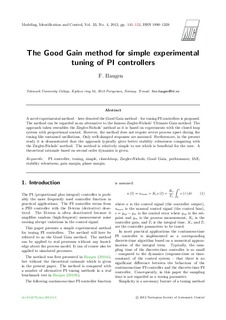| dc.contributor.author | Haugen, Finn | |
| dc.date.accessioned | 2013-03-20T11:12:45Z | |
| dc.date.accessioned | 2017-04-19T12:49:49Z | |
| dc.date.available | 2013-03-20T11:12:45Z | |
| dc.date.available | 2017-04-19T12:49:49Z | |
| dc.date.issued | 2012 | |
| dc.identifier.citation | Modeling, Identification and Control, 33 (2012) No.4, 141-152. | |
| dc.identifier.issn | 1890-1328 | |
| dc.identifier.uri | http://hdl.handle.net/11250/2438410 | |
| dc.description.abstract | A novel experimental method { here denoted the Good Gain method { for tuning PI controllers is proposed. The method can be regarded as an alternative to the famous Ziegler-Nichols' Ultimate Gain method. The approach taken resembles the Ziegler-Nichols' method as it is based on experiments with the closed loop system with proportional control. However, the method does not require severe process upset during the tuning like sustained oscillations. Only well-damped responses are assumed. Furthermore, in the present study it is demonstrated that the approach typically gives better stability robustness comparing with the Ziegler-Nichols' method. The method is relatively simple to use which is beneficial for the user. A theoretical rationale based on second order dynamics is given. | |
| dc.language.iso | eng | |
| dc.publisher | Norwegian Society of Automatic Control | |
| dc.rights.uri | http://creativecommons.org/licenses/by/3.0/ | |
| dc.subject | PI controller | |
| dc.subject | Tuning | |
| dc.subject | Good Gain | |
| dc.subject | Stability robustness | |
| dc.title | The Good Gain method for simple experimental tuning of PI controllers | |
| dc.type | Journal article | |
| dc.type | Peer reviewed | |
| dc.description.version | Published version | |
| dc.rights.holder | © Copyright The Author | |
| dc.subject.nsi | 563 | |
| dc.identifier.doi | http://dx.doi.org/10.4173/mic.2012.4.3 | |

